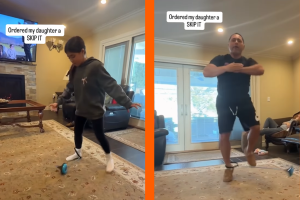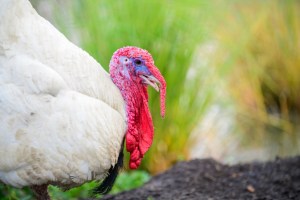Growing up in rural Kenya, Dianah had two choices for getting to school: She could walk three miles or hire a “boda boda” motorbike, if she had the money.
Neither option was particularly appealing.
The long walk was especially difficult in a culture that expects young girls like Dianah to handle their domestic duties in the morning before heading off to the classroom, while the boys are free to wake up and go.
And even when if her parents could afford to pay for a ride from the so-called “motorcycle men,” there was still a risk of assault involved in the country’s makeshift transportation service.
“These men who ride the motorcycles, they want to get the girls, they annoy them and then meet them here outside. They normally stop you when you’re on the way [to school]. They tell you that they want to offer you a ride, but when you go with them, they will take you and refuse to…” Dianah explains, trailing off.
Dianah. All photos provided by World Bicycle Relief, used with permission.
Even when the trek went well, the threat of rape and bodily harm followed Dianah and her friends into the classroom and hurt their education.
Teen pregnancy is known to have a damaging effect on education, and teen birth rates are high in Kenya. The looming menaces of child abuse, poverty, and other traumatic events can also have a lasting impact on the development of a young mind. This all compounds with stress and the exhaustion from waking up early to take care of chores, and, of course, walking several miles while avoiding assault.
The administration at Dianah’s school does what they can. But it’s not easy. “We have involved the parents in driving their children, but it is not always affordable,” says Dianah’s vice principal, Monicah Ndun’gu. “We also have guidance and counseling sessions in school where we talk about issues of pregnancy and how the girl can be able to protect herself.”
But something changed during Dianah’s junior year, and all it took was balance and a little legwork.
Dianah was one of 100 students at her school to receive a free Buffalo bicycle courtesy of World Bicycle Relief, a nonprofit that aims to mobilize and empower underprivileged communities across the world with the help of bicycles. 70 of the bicycles went to girls to help compensate for the gender inequalities in the country, with the other 30 going to the boys in the classroom.
For Dianah’s part, she’s able to arrive extra-early at school to prepare for the day, and she feels more energized and less tired than before. She even stays later after school to finish her homework or work on projects, and she doesn’t have to worry anymore about walking home alone at night. “When you have the bicycle, you pass by motorcycle men very fast and they won’t ride after you,” she says.
“Performance records have really improved in the last year, for both boys and girls, since they got the bicycles. It has also reduced absenteeism of both. And many of the girls are happier now that they are able to get to school on time, and to home on time, too,” adds Vice Principal Ndun’gu, saying that she’s observed a noticeable reduction in student pregnancies, too.
“When I have the bicycle, it’s like flying through the forest,” Dianah says. “We can ride together with friends on the bicycles and we are stronger.”
Before the bicycle, Dianah’s life was mostly schoolwork, chores, and walking between them. Now, with faster commutes, Dianah and her friends are able to spend more time together. She has an easier time socializing with the boys in her classroom, many of whom she sees as brothers and who she also says have been challenged in exciting ways by the newly energized girls in the classroom.
Her family is just as excited about these new two-wheel opportunities. Dianah lives on a farm plot with her parents, a younger brother and sister, and three orphans. “At home, I normally help my parents. Now when they want to send me to the market, I use the bicycle and there are no more distractions on the way,” Dianah says.
“They’ve seen me change, because I want to really use the bicycle for their help and also for my health.”
Now a senior in high school, Dianah is anxiously awaiting the results of her exit exams.
“After my results, I would like to study as a lecturer in education,” she says. She even wrote a powerful poem about her passion for schooling, called “Education for All”:
“The right to education is for all, even for a girl
People may wish for sons, but I’m glad I was born, born a girl child
Challenges may be more, but the blessings will be bigger
You educate a girl
You’ve educated a nation
It’s only education that equalizes a rich man’s daughter
And a poor man’s daughter
As I cycle my Buffalo Bicycle to school every day
I know, my future will be great.”
As Dianah says, education is a great equalizer for gender and poverty.
These are both complicated issues, of course, especially in rural African areas like the one where Dianah lives. When it comes to these socio-economic-cultural struggles, it can be hard to isolate and solve the root of the problem.
But sometimes something as simple as a bicycle, or even a washing machine, can treat enough of the symptoms to open up new opportunities and let these students shine. That’s pretty amazing.


























































